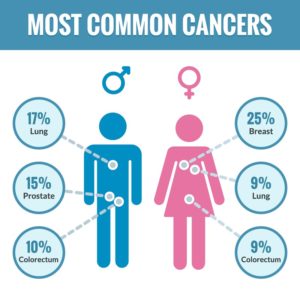
There is a significant amount of new cancer cases and cancer deaths in the United States each year. Last year, there were more deaths as a result of cancer than in both the World Wars combined. There were almost two million new cases of cancer in the U.S., and just over half a million deaths from cancer. Almost every American knows someone with cancer or has had it themselves.
Democratic Presidential hopeful Joe Biden is no different than most Americans. He has also felt the devastating effects of cancer. His son, Joseph Biden III, died from a brain tumor when he was forty six years old. Biden III was a veteran of the Iraq war. He was treated through surgery, chemotherapy, and radiation before ultimately losing his battle with cancer.
The cancer that Biden III passed from, Glioblastoma multiforme (GMB), is a very aggressive form of brain cancer. It is actually the same kind of cancer that former Senator John McCain had as well. There is currently no way to prevent this form of cancer or treat it once it has taken shape. It also almost always recurs. After it is diagnosed, most people live less than a year and a half. The survival rate for 5 years after diagnosis is between 3-5%.
The Federal Government’s Help In The Fight
During his time in office, Barack Obama called for more federal investment in the fight against cancer. He wanted the government to help private researchers find a cure for this terrible disease. His first move in doing so was to appoint then Vice President Biden as head of the Cancer Moonshot Initiative (CMI). The Initiative’s main mission was to find better ways to treat and prevent cancer.
Biden has used his public platform to call attention to this problem that affected him personally. With more research on cancer, Biden wants to increase treatment options and improve the quality of life for people like his son. The end goal is to find new therapies that may cure cancer altogether. The Initiative thinks its important to increase the rate of research so we can find out more about the disease in a shorter time period. They also believe we need to come up with a new strategy in the fight against cancer.
The CMI was given $1.8 billion for cancer research over seven years by the federal government. Under the Trump administration, it is not a White House Initiative, but it is still getting federal funds from the National Cancer Institute. Biden also works to cure cancer in the private sector by starting the nonprofit Biden Foundation.
Why was Biden Criticized?
 Biden was criticized, however, when he said he would “cure” the disease if elected president. The idea of “curing cancer” is now thought of as an older phrase that does not bring real progress to the U.S. fight against the disease. To quote the former VP, Biden said, “I’ve worked so hard in my career to make sure that … that I promise you, if I’m elected president you’re going to see the single most important thing that changes America, we’re gonna cure cancer.” The phrase has gone out of use since most researchers now realize that the word “cancer” represents a family of diseases that number in the hundreds.
Biden was criticized, however, when he said he would “cure” the disease if elected president. The idea of “curing cancer” is now thought of as an older phrase that does not bring real progress to the U.S. fight against the disease. To quote the former VP, Biden said, “I’ve worked so hard in my career to make sure that … that I promise you, if I’m elected president you’re going to see the single most important thing that changes America, we’re gonna cure cancer.” The phrase has gone out of use since most researchers now realize that the word “cancer” represents a family of diseases that number in the hundreds.
Risk Factors for Cancer
The likelihood of getting cancer is influenced by a few things. We know both the environment and the genes we get from our ancestors play an important role. Cancer research has helped us find certain genes that are damaged by chemicals and ultimately lead to cancer development. For example, scientists in the 1990s were able to find two genes in women that were linked with breast cancer. As a result, doctors were able to know who was at a higher risk for getting that disease.
Biden also thinks that chemicals may have played a role in his son’s cancer, as well as other military service members. Waste was burned at US military sites in Iraq, and the waste contained harmful toxins. Biden expressed concern that the health of the U.S. military was affected through exposure to different environments at bases that are overseas.
Private Research and Investment
 The effort to have more cancer research is accompanied by the Democratic Party’s push for a single payer healthcare system. However, there needs to be a balance in how we research cancer. Most of the progress we have made so far has come from private, for-profit companies. These companies have an important place in medical research.
The effort to have more cancer research is accompanied by the Democratic Party’s push for a single payer healthcare system. However, there needs to be a balance in how we research cancer. Most of the progress we have made so far has come from private, for-profit companies. These companies have an important place in medical research.
For example, AstraZeneca just announced a project with a Japanese company to work on a new drug. The drug has shown good early signs of being able to treat aggressive breast cancers. Without this kind of effort from the private sector, it is likely these sort of treatments would not be developed as quickly and would hurt the country in its fight against cancer.
So while single payer healthcare would provide us all with health insurance, it may not bring the development to cancer research that the CMI originally hoped for. Under current single payer systems in other countries, people with cancer have lower survival rates than the United States. Many people with cancer come to the U.S. to get treatment as a result.
Beyond Politics
Rather than talking about a “cure” which Biden knows is unrealistic, citizens would rather candidates talk about the things that affect their everyday lives. These include lowering drug prices and further medical development through a combination of public and private funding. President Trump has begun efforts to do these kinds of things, but has not been completely successful so far.




























